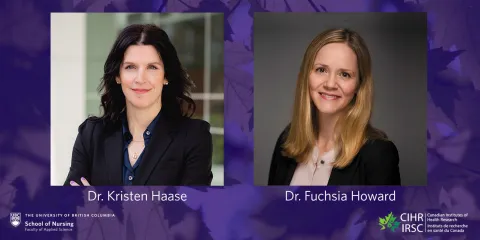We proudly announce that Dr. Kristen Haase and Dr. Fuchsia Howard have been successful in their CIHR Project Grant Applications for 2025.

July 22, 2025
These two successful grants are among a total of 54 projects led by UBC researchers, amounting to $47.0 million in combined funding through the Canadian Institutes of Health Research (CIHR) Project Grant: Spring 2025 competition.
Dr. Kristen Haase
Additional PIs: McConnell, Kelly (Memorial Sloan Kettering Cancer Center); Puts, Martine (University of Toronto); Sattar, Schroder (University of Saskatchewan)
A mixed methods study of cancer care in Canada
$344,251 (3 years 6 months)
Ageism is the act of discriminating against people based on their age. In Canada, cancer is most common among older adults (over age 65). Older adults are more likely to receive care based on age rather than on their physical and functional health. The 2023 American Society of Clinical Oncology (ASCO) guideline for care of older adults describes the need for comprehensive geriatric assessment (geriatric assessment) to guide treatment and support informed decision making. In Canada, geriatric assessment before cancer treatment for older adults is the exception, and not the rule, with only 3 provinces offering access to geriatric assessment across the country. As a result, older adults with cancer are most likely to be overtreated and/or undertreated. The outcome of both of these approaches is that the treatment they receive is not tailored to their needs. Ageism is a known and described problem in cancer care, but the scope of the problem is hard to determine. What is known is that ageism can impact treatment choices, and have unjust negative impacts on older adults with cancer. The purpose of this study is to scope the problem and generate evidence to form a foundation for future solutions. We will used multiple research methods, including surveys with healthcare professionals. We will also conduct interviews with older adults with cancer and healthcare professionals to understand their lived experiences. Finally we will share the study findings through a series of cross-Canada conversations with the goal of sharing the proposed solutions and exploring their feasibility to transform cancer care.
Dr. A. Fuchsia Howard
Additional PIs: Haljan, Gregory (Medicine); Istanboulian, Laura (University of Toronto)
Co-Creating and Amplifying Patient Perspectives to Transform Recovery (CAPTURE) after Critical Illness: Peer-Facilitated Online Group Photovoice
$371,024 (3 years)
Surviving a life-threatening illness in the intensive care unit (ICU) is just the beginning of a long and difficult recovery. Many ICU survivors face new or worsening health problems when home, making daily life difficult and greatly impacting quality of life. At the same time, family members often become caregivers, leading to their own physical and mental health struggles. Unfortunately, ICU survivors and caregivers often feel isolated, lacking the necessary support and resources, and there is limited awareness of recovery challenges. Our team's prior piloting of a Peer-Facilitated Online Group Photovoice workshop with ICU survivors suggests this format facilitates emotional healing and connection with others, and creates authentic portrayals of recovery. Further, photovoice exhibits can empower people to share their experiences, potentially raising awareness and influencing social change. This research aims to 1) assess the impact of photovoice workshops on participants' emotional and social well-being, 2) document the realities of recovery from critical illness through the photos and stories of ICU survivors and their caregivers, and 3) create a virtual photo exhibit to promote awareness of critical illness recovery. In this 3-year, patient-oriented research, we will deliver Peer-Facilitate Online Group photovoice workshops to ICU survivors and family caregivers. Each participant will generate and discuss photographs and narratives of their personal experiences with peers over 5 weeks. We will use qualitative methods to analyze participants' accounts of the therapeutic influences of workshop participation and their recovery experiences as depicted in photographs and discussed with peers. We will then utilize study findings to co-create a virtual exhibit with patient partners. Our ultimate goal is to lay the foundation for further work that eases the profound and long-term psychosocial burden of critical illness recovery.


